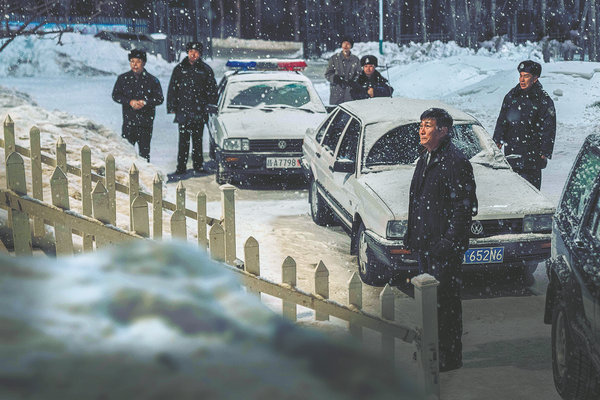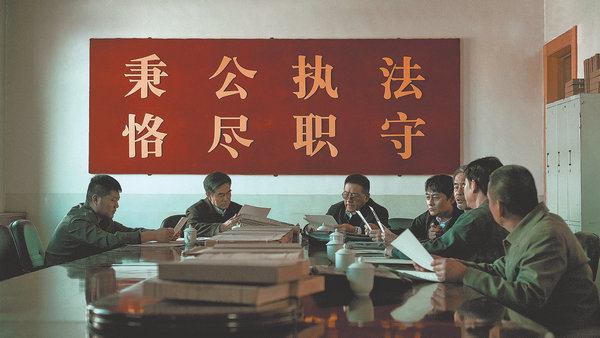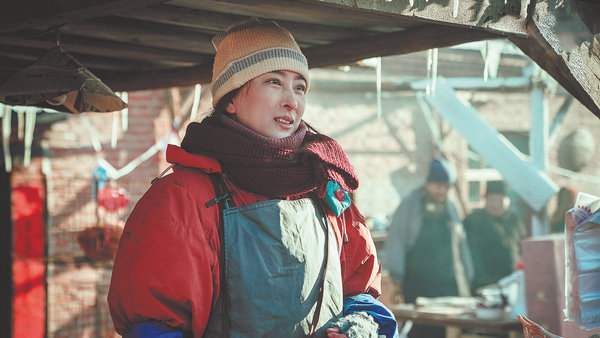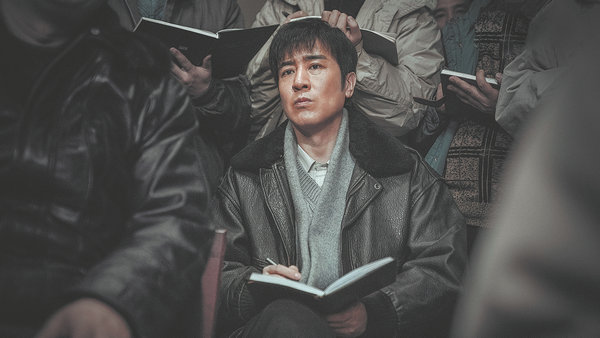
We Are Criminal Police, a popular TV series inspired by real-life events, recounts 15 infamous cases, including one where police officers investigate the rape and murder of a teenage girl in the snowy wilderness. [Photo provided to China Daily]
Over four years ago, director Hui Kaidong first laid eyes on the script of the TV series We Are Criminal Police, and was immediately drawn to its authentic and unembellished storytelling.
Commissioned by the News Media Center of the Ministry of Public Security, the program stirred his memories of a critically acclaimed 1999 drama based on a real-life case — which involved a police officer's tragic death in a car crash — leading to the theft of his service pistol and triggering a gripping sequence of events in Xi'an, Shaanxi province, in 1997.
Hui, a seasoned veteran with over two decades in the television industry, previously worked as a cinematographer on the series. Since then, he nurtured a long-held aspiration to direct his own crime series.
"When I was filming the 1990s drama, I lived with the police officers who solved the case in Xi'an for several months. This experience left a deep impression on me regarding their dedication to safeguarding our people and society, sometimes risking their own lives," recalls Hui.
As an example, Hui recounts how the officers would often mention that they were on call even at night. "Whenever the phone rang, they would promptly get up and inform their wives or families, 'I need to go.' However, they never knew when they would return or if they would make it back home at all," he adds.

Scenes from the series' inaugural case depict police officers in a small city in northeastern China investigating four masked gunmen committing a mine robbery , with actress Ma Su portraying the wife of one of the criminals, and actor Yu Hewei playing the protagonist, Qin Chuan, a dedicated and skilled officer. [Photo provided to China Daily]
Taking up the new drama as homage to the 160,000 Chinese police officers combating crime on the front lines, Hui set aside other projects and committed one-and-a-half years to leading his team across the country for preparations. They meticulously observed the daily work and life of officers in various cities and scouted for the most suitable filming locations, ranging from Hegang in Northeast China's Heilongjiang province to Chongqing in Southwest China.
One of the moments he found most impressive was visiting Cui Daozhi, a 91-year-old expert revered as China's Sherlock Holmes. As a trailblazer among the country's first-generation forensic policemen, Cui participated in the on-site investigations of over 1,000 cases and identified more than 7,000 pieces of trace and physical evidence without a single error.
"Under rudimentary conditions at that time, Cui provided crucial evidence for many cases with exceptional dedication and professionalism," says Hui.
Scriptwriter Xu Meng interviewed over 200 police officers and gathered materials totaling 2 million words in eight months, creating 15 representative cases — all inspired by real-life stories.
Consisting of 38 episodes, the ensemble-cast drama intertwines the process of hunting and identifying criminals in these cases with the career trajectory of Qin Chuan, a committed police officer portrayed by Yu Hewei.

Scenes from the series' inaugural case depict police officers in a small city in northeastern China investigating four masked gunmen committing a mine robbery , with actress Ma Su portraying the wife of one of the criminals, and actor Yu Hewei playing the protagonist, Qin Chuan, a dedicated and skilled officer. [Photo provided to China Daily]
Beginning in the early 1990s, a small city immersed in the excitement of Spring Festival is shaken by a horrific event — four masked gunmen invade a mine with a well-planned scheme to steal over 1 million yuan ($136,395) in cash. During the clash with security personnel, they fatally shoot nine individuals, including a young boy who unintentionally follows his father back to the mine's factory.
Qin, the protagonist, a recent graduate from a police academy, unexpectedly finds himself among the first group of police officers to arrive at the scene, along with two colleagues. The brave officers risk their lives to enter the factory, not sure whether the ruthless criminals are still inside as the force lacked technical support at that time.
Demonstrating his sharp wit and keen observation skills, Qin, despite being a novice at the time, uncovers crucial clues and apprehends the criminals. This marks the beginning of his decades-long pursuit of solving increasingly complex cases, from capturing a serial robber responsible for 11 deaths across multiple cities to unraveling a series of brutal rape and murder cases.
Spanning 35 years, the show also reflects China's progress in criminal investigation technology, transitioning from relying on visual evidence and extensive police investigations into all households related to the case to utilizing DNA analysis and surveillance cameras for swift case resolution.
"We made authenticity our top priority, promoting natural dialogue. In conference scenes, I told the actors not to worry about memorizing lines. Stuttering or repeating words is fine; it reflects real meetings, especially when police officers are working all night and getting only a few hours of sleep," Hui reveals about the behind-the-scenes stories.

Scenes from the series' inaugural case depict police officers in a small city in northeastern China investigating four masked gunmen committing a mine robbery , with actress Ma Su portraying the wife of one of the criminals, and actor Yu Hewei playing the protagonist, Qin Chuan, a dedicated and skilled officer. [Photo provided to China Daily]
Interestingly, in the first several episodes, the story takes place in snowy northeastern China, depicting scenes from the daily lives and work of police officers. One scene shows a police captain cooking pork bone soup in his office.
"During scriptwriter Xu's research, she discovered that many police officers often have to stake out suspects for long periods during investigations, resulting in irregular meal times. Struggling with digestive issues, they need to eat warm food," explains the director. "These scenes are inspired by real-life situations. However, with the implementation of standardized management in recent years, cooking in offices is no longer a common practice."
Due to the cases occurring in various cities across the country, Hui led the crew in overcoming a variety of natural challenges, including placing heaters under cameras to ensure they functioned in — 40 C in Hegang, as well as enduring hot and humid conditions exceeding 40 C in Chongqing.
The drama concluded its initial run on China Central Television's CCTV-8 in late December and was subsequently broadcast on Beijing Satellite TV and Shanghai's Dragon TV, setting a record by reaching over 1.1 billion program subscribers.
With a rating of 7.7 out of 10 on the popular review aggregator Douban, the show has garnered acclaim from both critics and industry insiders. Wang Yichuan, vice-chairman of the China Literature and Art Critics Association, remarks that the drama offers viewers a vivid experience, immersing them in the process of solving mysteries alongside the officers, thus setting a good reference for the future creation of Chinese crime investigation dramas.